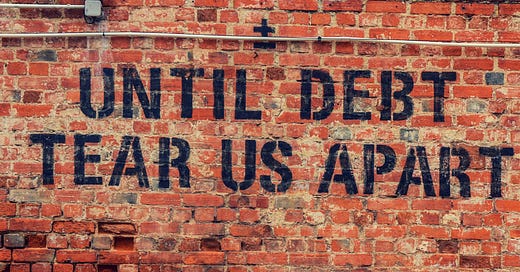
Over the past couple of months, the public popularity of the Republicans' tax-cut law has seen a dramatic trend upward. Back in December, only 30% of Americans favored the bill, while 51% viewed it unfavorably. Today, the split is nearly even at 43/44. That shouldn't surprise many people, as lots of Americans are enjoying larger take-home pay as a result, rather than the "Armageddon" that Nancy Pelosi had promised. One should expect the law's popularity to continue to rise as pro-rated 2018 paychecks arrive in the mail and wire transfers.
Politically, this should end up helping Republicans, granting congressional GOPers a bragging point in what is expected to be a rough midterm election this November. Right now, Democrats are favored in general ballot polls by nearly ten points.
President Trump should certainly be given some credit, not just for signing the bill into law, but also for largely getting out of the way of the legislation process. Unlike during the healthcare battle, Trump refrained from torpedoing his own party's legislation with stinging criticism on Twitter and in public appearances, thus letting Paul Ryan and Mitch McConnell work their magic without having to take media-fueled fire from both sides (the demagoguery from the Left was bad enough). Trump was prepared to sign whatever bill Congress gave him, and fortunately he was handed a pretty decent one.
It's fascinating to look back at Trump's first year in office, purely from a policy standpoint. Legislatively, we saw a remarkably traditional Republican agenda which provided a stark contract from the anti-establishment theme we'd heard so often during Trump's campaign. Matthew Continetti recently offered an explanation for this in a piece for National Review:
"When Paul Ryan launched his 'Better Way' agenda in 2016, the idea was to provide a blueprint for the next Republican administration. The man who would lead that administration was skeptical, to say the least. The Ryan agenda, focusing on health care, taxes, military spending, and welfare reform, was resisted and belittled by Donald Trump’s populist-nationalist supporters. But a funny thing happened when Trump won the presidency. It was Ryan’s priorities that shaped Trump’s first year in office."
Continetti is right, of course, even if ardent Trump supporters don't want to admit it. For better or for worse, Trump shelved many of the radical Steve Bannon-approved ideas he ran on (and put forth in his inauguration speech), and instead adopted the agenda of a guy much of his base viscerally hates: Paul Ryan. Healthcare reform was a failure, but tax reform was a success, and the defense sequester has been ended.
Now that we've entered year two of the Trump administration, however, it's becoming clear that the Ryan agenda has about run its course, and the Trump agenda is emerging to the forefront.
While an almost daily-dose of White House drama, and controversial rhetoric from our president (on everything from gun confiscation, to trade wars, to corruption inside our intelligence agencies) continue to drive our news cycle, our looming national debt is now at over $20 trillion.
This is a dire threat to our economy, our national security, and the qualify of life for future generations of Americans. Yet, Trump is holding on to his vow not to reform entitlements — the largest drivers of our debt (by far). Without presidential support, entitlement reform (a longtime Ryan and GOP goal) is a non-starter.
Sadly, deficit spending has actually risen under Trump. In his first year, the president managed to top the $587 billion annual deficit he inherited, and by next year the deficit will reach $1.2 trillion. Within 10 years, it will reach $2 trillion.
Unfortunately, fiscal restraint is neither a guiding principle, nor a topic of particular interest in this Republican White House. This has been apparent in everything from the proposed trillion-dollar infrastructure bill, to the cost of the border wall (paid by us, not Mexico), to Trump's $13.5 million in travel expenses (during his first year alone), to his calls for a totally unnecessary military parade (estimated to cost up to $30 million).
Trump has always subscribed to a "the bigger the better" mindset. We've known this about him since long before he ever entered the political arena. It's been a hallmark of the Trump brand for decades, and he has brought that philosophy with him to the presidency (where it's no longer his money that's on the line).
This is not a good situation. And as Daniel Hannan points out in a recent piece for the Washington Examiner, it's happening at the worst possible time:
"What makes this development especially bizarre is that this fiscal incontinence is taking place at a time of strong growth and low unemployment. Supporters of Obama’s splurge could at least argue that he was engaged in pump-priming during a downturn. I never found that a convincing argument, but plenty of Keynesians sincerely believe in it.
Today, though, even that flimsy justification has been ripped away. There is no argument, whatever school of economics you follow, for emptying your nation’s coffers and exhausting its credit during a boom. Sure, the cuts in corporation tax will, over time, yield higher revenues. But in the meantime, where are the spending reductions? Why are conservatives going along with — no, scratch that, why are conservatives enthusiastically cheering — measures that they would recently have condemned as a betrayal of the national interest?"
Now that's the million dollar question (excuse the pun): Why don't conservatives care?
They certainly cared when it was President Obama and the Democrats that were driving our country off a fiscal cliff. That's when the Tea Party movement was formed, rose to prominence, and drove candidates running on fiscally conservative platforms into office. But today, other than from some persistent Trump-skeptics on the right, you don't hear a lot of dissent — not from the Republican congress and not from the Republican base.
Part of the reason is because Trump won both the Republican nomination and the general election on that big-government, big-entitlement platform. Thus, he has given cover to congressional leaders who've long struggled to sell their message of fiscal conservatism to an electorate that just doesn't grasp (or care about) the ramifications of the size of our national debt.
In other words, if the leader of the party treats it like it's no big deal, and won with that attitude, why should others in the party put their necks on the line? Why should they take that risk?
At least there's been a fair amount of push-back against Trump's ridiculous steel and aluminum tariffs, which are being sold by the president as dealing with a different kind of deficit — a largely irrelevant one known as the trade deficit. The supposed protectionist measure will — by all accounts — benefit very few Americans while hurting virtually everyone with higher consumer costs... all in the name of some abstract definition of balance.
Sounds like something President Obama would have come up with.
But Obama's gone, and so is nearly every Republican fiscal argument that was used to challenge his policies. For the most part, when it comes to such matters, the Modern Right (in DC, in the conservative media, and in the Republican base) seems content with just letting Trump be Trump.
That proved to be an effective strategy for our president during the election, but when it comes to governance and leadership on the defining issue of our time, it's a catastrophic mistake. We can't afford this, and we need to get back to acknowledging that fact.












